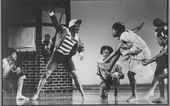About Games

Premiere May 1951
Donald McKayle & Co. • Hunter Playhouse, New York, NY
Choreography • Donald McKayle
Music • Traditional Children’s Songs and Chants
Original Costume Design • Remy Charlip
Original Set Design • Paul Bertelsen
Original Lighting Design • Pamela Judson Style
Created: 1951
Time: 18 minutes
Dancers: 4 men, 3 women
Singers: 1 man, 1 woman
Available for Re-staging: Yes
Categories: Classic Work, Small Ensemble
PLAY • HUNGER • TERROR
The streets are their playground. Through all their play runs a thread of fear…"Chickee, the cop!"
Games dramatically observes city children at play…the serious business of being a child. It is divided into three uninterrupted sections: Play, where we meet the children see their interaction and experience the joys of childhood, Hunger which explores living and growing with deprivation, and Terror in which fear and brutality wipes away innocence. Games is unique in its presentation as dance theatre in that there is no instrumental music. Songs from the rich heritage of oral transmission in both the rural and urban communities of the United States accompany the dance movement and are performed a cappella by the cast of singers and dancers.
Games was premiered May 1951 at the Hunter Playhouse in New York City as Donald McKayle's initial full scale choreographic offering for his concert dance group, "Donald McKayle and Company." Games has since been recognized as a modern dance classic and is in the repertories of the Alvin Ailey American Dance Theater, the Dayton Contemporary Dance Company, the Lula Washington Dance Theatre, the Cleo Parker Robinson Dance Ensemble, Ballet Hispanico, Ballet San Jose Silicon Valley, Dallas Black Dance Theatre, among others. The mounting of Games on the African American Dance Ensemble in 1986 was the pilot work that inaugurated the American Dance Festival's prestigious project, "The Black Tradition in American Modern Dance." Under the sponsorship of the Ford Foundation and the National Endowment for the Humanities, many modern dance masterworks have been reconstructed on dance companies throughout the nation.
Donald McKayle & Co. • Hunter Playhouse, New York, NY
Choreography • Donald McKayle
Music • Traditional Children’s Songs and Chants
Original Costume Design • Remy Charlip
Original Set Design • Paul Bertelsen
Original Lighting Design • Pamela Judson Style
Created: 1951
Time: 18 minutes
Dancers: 4 men, 3 women
Singers: 1 man, 1 woman
Available for Re-staging: Yes
Categories: Classic Work, Small Ensemble
PLAY • HUNGER • TERROR
The streets are their playground. Through all their play runs a thread of fear…"Chickee, the cop!"
Games dramatically observes city children at play…the serious business of being a child. It is divided into three uninterrupted sections: Play, where we meet the children see their interaction and experience the joys of childhood, Hunger which explores living and growing with deprivation, and Terror in which fear and brutality wipes away innocence. Games is unique in its presentation as dance theatre in that there is no instrumental music. Songs from the rich heritage of oral transmission in both the rural and urban communities of the United States accompany the dance movement and are performed a cappella by the cast of singers and dancers.
Games was premiered May 1951 at the Hunter Playhouse in New York City as Donald McKayle's initial full scale choreographic offering for his concert dance group, "Donald McKayle and Company." Games has since been recognized as a modern dance classic and is in the repertories of the Alvin Ailey American Dance Theater, the Dayton Contemporary Dance Company, the Lula Washington Dance Theatre, the Cleo Parker Robinson Dance Ensemble, Ballet Hispanico, Ballet San Jose Silicon Valley, Dallas Black Dance Theatre, among others. The mounting of Games on the African American Dance Ensemble in 1986 was the pilot work that inaugurated the American Dance Festival's prestigious project, "The Black Tradition in American Modern Dance." Under the sponsorship of the Ford Foundation and the National Endowment for the Humanities, many modern dance masterworks have been reconstructed on dance companies throughout the nation.